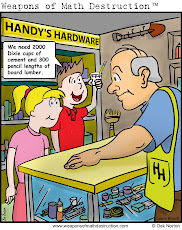To really get a full look at what "success stories" according to Pearson (the publisher of Investigations) really looks like.. just take a look and see:
Vestavia Hills West Elem School, AL
DROPPED
Naperville CUSD 203, IL
DROPPING
Framingham School District, MA
DROPPED
Anoka-Hennepin ISD 11, MN
DROPPING
Inver Grove District 199, MN
DROPPED
Little Falls ISD 482, MN
DROPPING
Staples-Motley ISD 2170, MN
DROPPED
Stillwater District 834, MN
DROPPED
Waconia District 110, MN
DROPPED
White Bear Lake 624, MN
Text Book Review Underway (may drop – confirm in late 3/09) Grant MSP (Math Science Partnership) funds now depleted
Columbia District 93, MO
DROPPED
Greece, Central, NY
DROPPING
Penfield Central, NY
DROPPED AS CORE PROGRAM
Pittsford Central, NY
DROPPED AS CORE PROGRAM
Syracuse City School District, NY
DROPPED
Coventry Local School District, OH
DROPPED
Lebanon City School District, OH
DROPPED
Painesville City School District, OH
DROPPED
Three Rivers Local School District, OH
DROPPED
Wickliffe, OH
DROPPED
Gervais School District 1, OR
DROPPED
Sutherlin School District 130, OR
DROPPING
Chariot Regional District, RI
DROPPED
Alpine District, Utah
DROPPED
(Banned by USOE as primary text materials 2007)
Utah State Office of Education; state legislature initiative 2009 requires funding for Singapore Math
Arlington District 16, WA
DROPPING
Bellevue District 405, WA
DROPPING
Clover Park District 400, WA
DROPPING
Eastmont School District 206, WA
DROPPING
Lake Stevens District 4,WA
DROPPING
Oak Harbor, WA
DROPPING
Richland School District 400, WA
DROPPING
Black River Falls, WI
DROPPING
La Crosse, WI
DROPPING
River Falls, WI
DROPPING
Superior, WI
DROPPING
For anyone on the fence as to whether or not Investigations is failing your child (despite the fact that your child is getting an A or B as EVERY other child is)...take a look at all of the schools from across the United States and tell me that our children are not on the fast track to failure. As I have said over and over again...it is only a matter of time before our scores will force the administration to rethink this decision they have made for our children. How many of you want for it to take 6-7 years to figure it out? If these are "success stories" according to the publisher of Investigations from just 2 years ago, can you imagine what the failures must look like?
As we were reminded in a recent school board meeting by an administrator..."You cannot always believe everything the publisher says". We could not agree more after looking at these FACTS! So, the question remains..."why are we using this type of teaching? Show us some real success stories. Show us the FACTS! We are having lots of trouble believing since no one is telling us anything. Tell us why you are doing this to our kids, please. For some of us parents, we believe the clock it ticking and our childrens' futures are at stake. We do not trust at this point. Our childrens' reading scores tell the story, and now you have taken them down the fast track to failure with this new very controversial choice of math. Forgive us if we believe time is of the essence! We need change NOW!
If you are growing weary of no explanations or any offer to communicate with us, then remember how important it is to vote in April!

